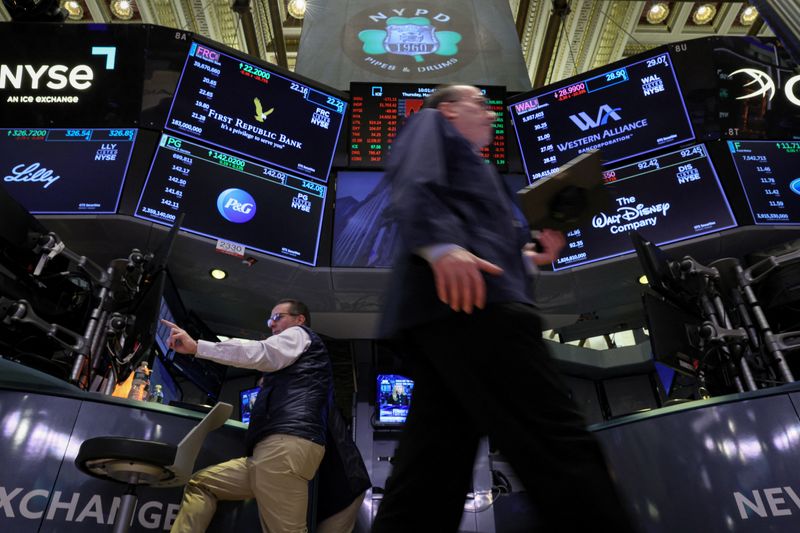Investing.com -- After Friday’s jobs report cemented expectations that the Federal Reserve will keep interest rates on hold later this month, the economic calendar will be lighter in the coming holiday-shortened week. Stocks go into September after notching up strong weekly gains last week, while data out of China will likely add to concerns over the outlook for the world’s number two economy. The Reserve Bank of Australia will likely stand pat for a third straight meeting and supply worries look set to underpin oil prices.
-
U.S. economic data, Fedspeak
Friday’s jobs report was the latest in a series of economic data indicating that the economy is heading for a so-called soft landing, adding to the view that the Fed is nearing the end of its rate hiking cycle.
Data in the week ahead is unlikely to do anything to alter this view significantly.
On Wednesday the Institute for Supply Management will release August data on service sector activity, with economists expecting it to soften slightly.
The same day the Fed will publish its Beige Book, a survey of economic activity across all the bank’s 12 districts.
Investors will also get the chance to hear from several Fed speakers during the coming week, including Dallas Fed President Lorie Logan, who speaks Wednesday followed a day later by appearances from New York Fed President John Williams, Governor Michelle Bowman, Governor Michael Barr and Chicago Fed President Austan Goolsbee.
-
Stocks kick off September
The Dow and the Nasdaq climbed 1.4% and 3.2% last week, respectively, posting their strongest weekly performances since July. The S&P 500 gained 2.5% for its best week since June.
Friday’s jobs report bolstered expectations for the Fed to pause rate hikes at its meeting later this month.
"The data makes the case for the Fed becoming more dovish as we head into the fall. If the end of tightening comes sooner than later, that could lead to a substantial rally in stocks," Keith Buchanan, a portfolio manager at GLOBALT Investments in Atlanta told Reuters.
Interest rate futures suggest traders now see a 94% chance the U.S. central bank will keep interest rates unchanged at its Sept. 19-20 meeting, according to Investing.com’s Fed rate monitor tool.
The U.S. stock market will remain closed on Monday for the Labor Day holiday.
-
China data
Economic data out of China in the coming week is likely to indicate that the economic recovery in the world’s second largest economy remains fragile amid weak demand in key export markets and a deepening domestic property crisis which has added to downward pressure on growth.
The Caixin services PMI for August is due on Tuesday and is expected to show the expansion in the service sector slowing slightly last month.
Trade data on Thursday is forecast to show that exports and imports contracted again in August from a year earlier, albeit at a slower pace than in July.
Market watchers will also be looking to August CPI data on Saturday with consumer prices expected to tick higher after slipping into deflation territory in July.
Chinese authorities have rolled out a series of measures aimed at reviving the faltering economy, but many analysts see only a slim chance for more drastic stimulus amid concerns over mounting debt risks.
-
Oil surges on supply concerns
Oil prices surged to their highest level in more than seven months on Friday, snapping two weeks of losses amid concerns over the tightening supply outlook.
For the week, Brent rose about 4.8%, the most it has increased in a week since late July. Crude Oil WTI Futures advanced by 7.2%, their biggest weekly gain since March.
Saudi Arabia is widely expected to extend a voluntary 1 million barrel per day oil production cut into October, prolonging supply curbs engineered by the Organization of the Petroleum Exporting Countries (OPEC) and allies, known collectively as OPEC+, to support prices.
"There is a realization the economy is not falling off the map, and signs that demand is near record highs," said Price Futures Group analyst Phil Flynn. "People have to face the cold, hard reality that supplies are below average."
The demand outlook in the U.S. remains robust, with commercial crude inventories declining in five of the most recent six weeks according to data from the U.S. Energy Information Administration.
-
Reserve Bank of Australia decision
The RBA is expected to hold rates steady for a third straight meeting on Tuesday, after recent data pointing to a faster-than-anticipated cooling in inflation.
Rates are at an 11-year high of 4.1% after 400 basis points of increases since May 2022. Traders expect that to be the peak, after inflation unexpectedly eased to 4.9% year-on-year in July, the lowest rate since it peaked last December at 8.4%.
In addition, the most recent jobs report showed that the unemployment rate rose to 3.7% in July from 3.5% in the prior month, adding to expectations for the RBA to stand pat.
--Reuters contributed to this report
